Local councils put affordable housing supply in the too hard basket
- Written by Alan Morris, Research Professor, University of Technology Sydney
Public concern about housing affordability in Australia is well documented. It would be reasonable to assume our local governments are giving the supply of affordable housing the attention it deserves. However, our national survey reveals that while it’s a growing concern for many local governments across the country, especially in metropolitan areas, most councils do not view the provision of affordable housing as a priority for them.
The survey results strongly suggest that local governments do not feel they have the capacity to intervene in a meaningful way.
The survey included a range of questions about local governments’ engagement with housing-related activities in their area. We asked about the priority given to housing issues, how important housing is relative to other council issues, and what kinds of policies and initiatives they plan to implement to help resolve the problem.
All 546 local governments in Australia were invited to participate in the survey. We received 213 responses. The majority, 72%, came from non-metropolitan areas (there are a lot more non-metropolitan local governments).
Do councils think it’s a problem in their area?
Almost all the metropolitan councils saw housing affordability as an issue (Figure 1). Half saw it as a very substantial or substantial issue. Only 13.5% said it was not an issue.
In contrast, only 26.6% of non-metropolitan councils responded that housing affordability is a substantial or very substantial issue.
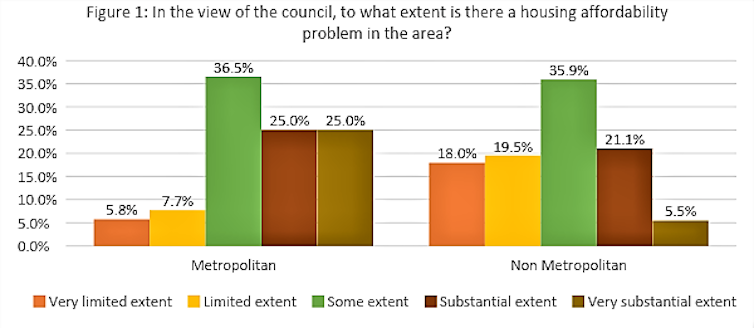 Author provided
The responses to the question about what proportion of housing stock in the council area is affordable were remarkable (Figure 2).
Half of the metropolitan councils said only 5% of the housing in their local government area (LGA) was affordable. Three-quarters said 10% or less. Even in the non-metropolitan areas, 43% of councils said only 15% of housing was affordable.
Author provided
The responses to the question about what proportion of housing stock in the council area is affordable were remarkable (Figure 2).
Half of the metropolitan councils said only 5% of the housing in their local government area (LGA) was affordable. Three-quarters said 10% or less. Even in the non-metropolitan areas, 43% of councils said only 15% of housing was affordable.
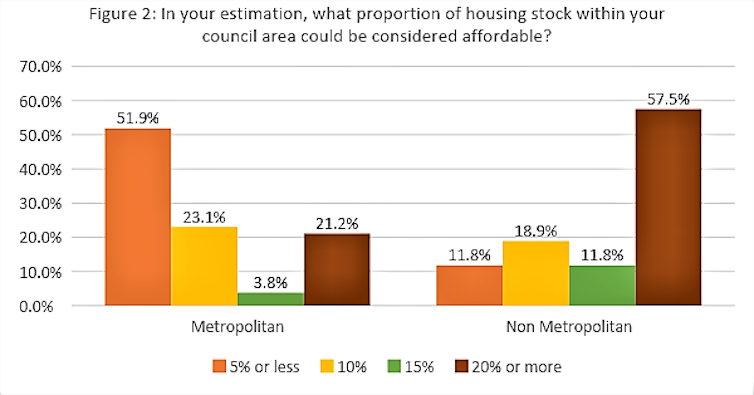 Author provided
What are councils doing about it?
Despite recognising the problem, very few councils appear to be making the provision of affordable housing a priority. Just 13.5% of respondents from metropolitan areas and 15.5% from non-metropolitan LGAs said their councillors gave housing affordability a substantial or very substantial amount of attention (Figure 3).
Author provided
What are councils doing about it?
Despite recognising the problem, very few councils appear to be making the provision of affordable housing a priority. Just 13.5% of respondents from metropolitan areas and 15.5% from non-metropolitan LGAs said their councillors gave housing affordability a substantial or very substantial amount of attention (Figure 3).
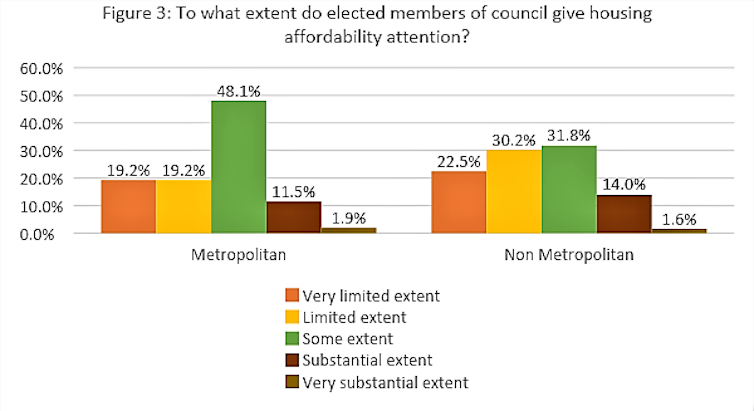 Author provided
Linked to this lack of attention, few councils viewed “finding ways to provide adequate affordable housing” in their LGA as a priority (Figure 4). Not one metropolitan council answered to a “very substantial extent”. Only a quarter said to “a substantial extent”.
About four in ten metropolitan councils and over half of the non-metropolitan councils viewed finding ways to provide adequate affordable housing locally as a non-priority. These councils had put this on the far backburner.
Author provided
Linked to this lack of attention, few councils viewed “finding ways to provide adequate affordable housing” in their LGA as a priority (Figure 4). Not one metropolitan council answered to a “very substantial extent”. Only a quarter said to “a substantial extent”.
About four in ten metropolitan councils and over half of the non-metropolitan councils viewed finding ways to provide adequate affordable housing locally as a non-priority. These councils had put this on the far backburner.
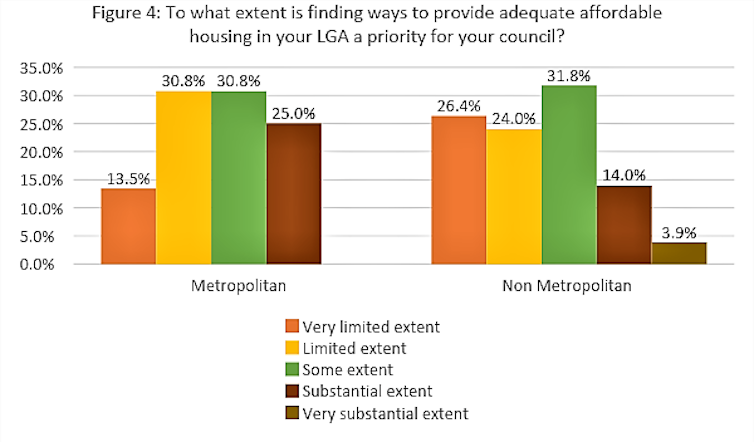 Author provided
Local governments were also asked what priority had been given to housing relative to other council issues (Figure 5). Just 1.8% of respondents in metropolitan areas and 5.2% in non-metropolitan areas said housing had been given “very high” priority.
More encouraging was that about four in ten councils in metropolitan areas did say they had given it high priority relative to other issues. Very few non-metropolitan councils, about one in five, said housing was a high priority or very high priority relative to other issues.
Author provided
Local governments were also asked what priority had been given to housing relative to other council issues (Figure 5). Just 1.8% of respondents in metropolitan areas and 5.2% in non-metropolitan areas said housing had been given “very high” priority.
More encouraging was that about four in ten councils in metropolitan areas did say they had given it high priority relative to other issues. Very few non-metropolitan councils, about one in five, said housing was a high priority or very high priority relative to other issues.
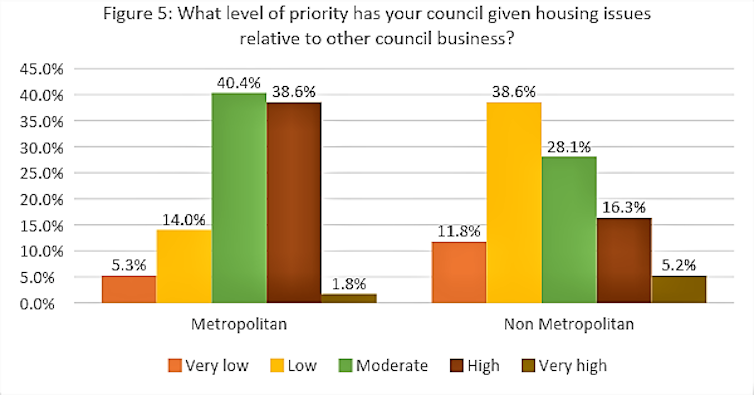 Author provided
Do councils have policies, targets or strategies in place?
Fewer than half of those surveyed said they had a “housing policy, housing plan or housing strategy” in place (Figure 6).
Author provided
Do councils have policies, targets or strategies in place?
Fewer than half of those surveyed said they had a “housing policy, housing plan or housing strategy” in place (Figure 6).
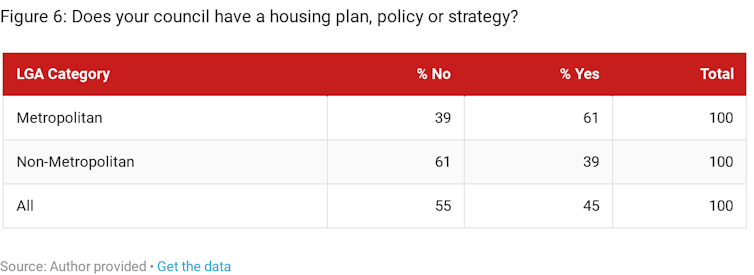 Author provided
Those that reported having a formal policy said it focused on such issues as housing affordability, residential land development, population change, urban design, social and public housing, and energy efficiency.
However, our survey reveals that those policies are not perceived as being particularly extensive. Figure 7 shows just one in four local governments in metropolitan areas and 10% from non-metropolitan areas believe their council’s housing policies are “comprehensive” to a very substantial or substantial extent.
Author provided
Those that reported having a formal policy said it focused on such issues as housing affordability, residential land development, population change, urban design, social and public housing, and energy efficiency.
However, our survey reveals that those policies are not perceived as being particularly extensive. Figure 7 shows just one in four local governments in metropolitan areas and 10% from non-metropolitan areas believe their council’s housing policies are “comprehensive” to a very substantial or substantial extent.
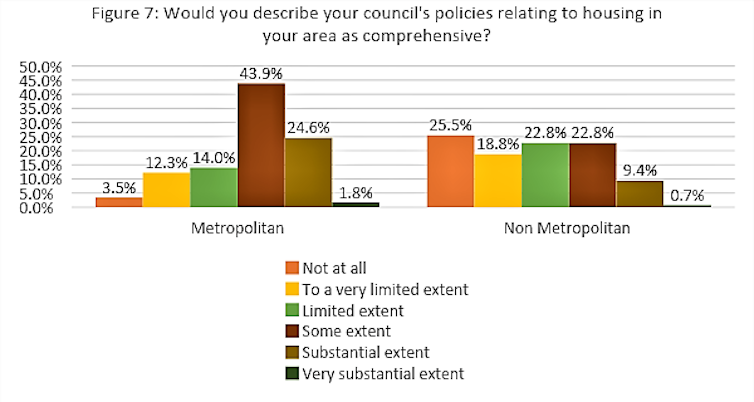 Author provided
The data suggest that having an explicit housing affordability target was viewed as unrealistic. Only 17.3% of metropolitan councils and 10.1% of non-metropolitan councils said they had an explicit target (Figure 8).
Author provided
The data suggest that having an explicit housing affordability target was viewed as unrealistic. Only 17.3% of metropolitan councils and 10.1% of non-metropolitan councils said they had an explicit target (Figure 8).
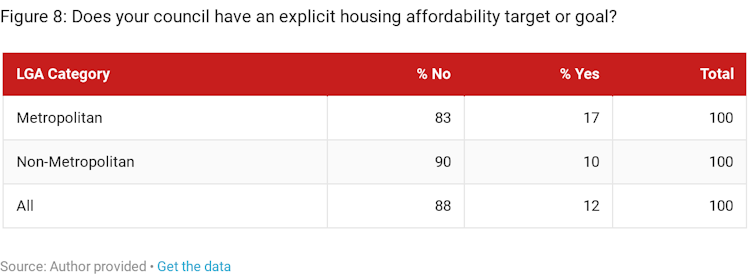 Author provided
Whose responsibility is it to provide affordable housing?
It’s noteworthy that, out of 213 councils, only one felt local government should be primarily responsible for “addressing the problems associated with housing in Australia” (Figure 9). The overwhelming sentiment was that state government or a combination of all levels of government should be responsible.
Author provided
Whose responsibility is it to provide affordable housing?
It’s noteworthy that, out of 213 councils, only one felt local government should be primarily responsible for “addressing the problems associated with housing in Australia” (Figure 9). The overwhelming sentiment was that state government or a combination of all levels of government should be responsible.
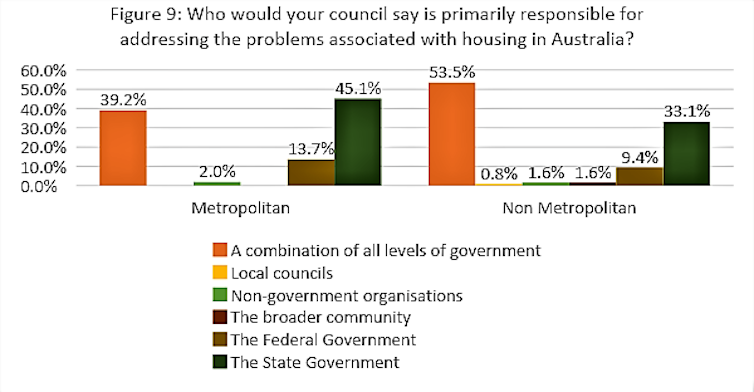 Author provided
The results suggest that improving housing affordability in a meaningful way is beyond the remit of local government. State and federal governments need to take the lead.
Although many councils are well aware that housing affordability is an issue in their area, they feel unable to respond in a meaningful way. An explanation for this is a unanimous view that Australia’s housing affordability problem is beyond the capacity of local governments to resolve. Almost all councils believe the provision of affordable housing is the responsibility of state and/or federal governments.
This is not surprising when we consider that local government accrues only 3.5% of all tax revenue. Local councils lack the fiscal capacity to develop affordable housing.
Further, state governments often override local governments’ efforts through the planning approvals to ensure all new developments have an affordable housing component.
Author provided
The results suggest that improving housing affordability in a meaningful way is beyond the remit of local government. State and federal governments need to take the lead.
Although many councils are well aware that housing affordability is an issue in their area, they feel unable to respond in a meaningful way. An explanation for this is a unanimous view that Australia’s housing affordability problem is beyond the capacity of local governments to resolve. Almost all councils believe the provision of affordable housing is the responsibility of state and/or federal governments.
This is not surprising when we consider that local government accrues only 3.5% of all tax revenue. Local councils lack the fiscal capacity to develop affordable housing.
Further, state governments often override local governments’ efforts through the planning approvals to ensure all new developments have an affordable housing component.
Authors: Alan Morris, Research Professor, University of Technology Sydney
Read more http://theconversation.com/local-councils-put-affordable-housing-supply-in-the-too-hard-basket-97461





